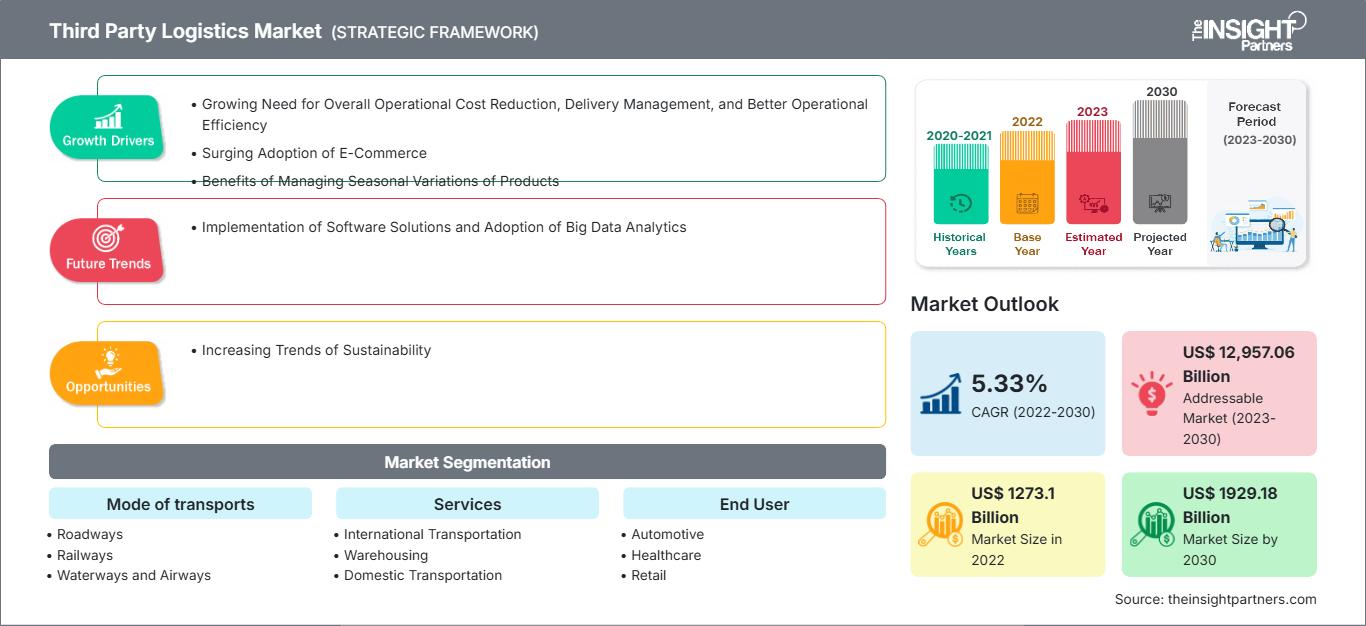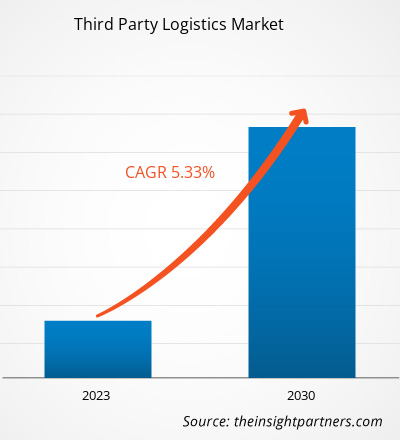Third Party Logistics Market Analysis and Opportunities by 2030
Third Party Logistics Market Size and Forecast (2020 - 2030), Global and Regional Share, Trend, and Growth Opportunity Analysis Report Coverage: By Mode of transports (Roadways, Railways, Waterways and Airways); Services (International Transportation, Warehousing, Domestic Transportation, Inventory Management, and Others); End User (Automotive, Healthcare, Retail, Consumer Goods, and Others) and Geography
Historic Data: 2020-2021 | Base Year: 2022 | Forecast Period: 2023-2030- Report Date : Nov 2023
- Report Code : TIPTE100000695
- Category : Automotive and Transportation
- Status : Published
- Available Report Formats :


- No. of Pages : 172
The third party logistics market was valued at US$ 1273.1 billion in 2022 and is projected to reach US$ 1929.18 billion by 2030; it is expected to register a CAGR of 5.33% during 2022–2030.
The growing proliferation of e-commerce is likely to remain a key trend in the market.
Third Party Logistics Market Analysis
The rise of e-commerce and the desire for same-day or next-day delivery propel demand for last-mile delivery services. For example, Amazon's Prime service has set new standards for fast delivery, prompting 3PLs to adapt their services to meet these expectations. Growing consciousness of environmental issues and sustainability has led to increased demand for eco-friendly logistics solutions. 3PL providers are adopting electric vehicles, optimizing routes to reduce emissions, and implementing sustainable packaging practices to align with consumer and regulatory expectations.
Third Party Logistics Market Overview
Transportation of manufactured goods from the factories to the warehouses is the first stage in the overall 3PL process. The 3PL business stores the product once it arrives at the warehouse or fulfillment center. The products are stored in accordance with their SKU, with each SKU having its own allocated storage place. Items entering the warehouse are normally entered into the provider's tracking system at this point. Software integration helps in efficient and effective processes.
Customize This Report To Suit Your Requirement
Get FREE CUSTOMIZATIONThird Party Logistics Market: Strategic Insights

-
Get Top Key Market Trends of this report.This FREE sample will include data analysis, ranging from market trends to estimates and forecasts.
Third Party Logistics Market Drivers and Opportunities
Benefits of Managing Seasonal Variations of Products to Favor Market
Third-party logistics firms have expanded resource networks that support prime companies enlarge efficiently in a cost-effective way. In addition, third-party logistics firms can deliver sufficient resources and elasticity in services for seasonal inventory or novel product releases. Many establishments experience seasonal variations in customer inclinations, and it becomes key to manage such swings to maintain effectiveness and meet the demand.
Application of Software Solutions and Adoption of Big Data Analytics
The adoption of RFID-enabled devices is also expected to store data for easy transport that will also simplify tracking and identification of products. Software related to transportation management systems will reduce inefficiency and costs. Furthermore, the usage of speech recognition software in warehouse management system communications will help with order turnaround and inventory records while lowering employee training needs. Along with this, the acceptance of cloud-based technology in third-party logistics organizations will respond to demands by recognizing the need for client access, allowing them to address seasonal trends better.
Third Party Logistics Market Report Segmentation Analysis
Key segments that contributed to the derivation of the third party logistics market analysis are mode of transports, services and end users.
- Based on the mode of transports, the third party logistics market is divided into roadways, railways, waterways and airways. The roadways segment held a larger market share in 2023.
- Based on the services, the third party logistics market is divided into international transportation, warehousing, domestic transportation, inventory management, and others. The domestic transportation segment held a larger market share in 2023.
- Based on the end users, the third party logistics market is divided into automotive, healthcare, retail, consumer goods, and others. The others segment held a larger market share in 2023.
Third Party Logistics Market Share Analysis by Geography
The geographic scope of the third party logistics market report is mainly divided into five regions: North America, Asia Pacific, Europe, Middle East & Africa, and South & Central America.
The scope of the third party logistics market report encompasses North America (the US, Canada, and Mexico), Europe (Russia, the UK, France, Germany, Italy, and the Rest of Europe), Asia Pacific (South Korea, India, Australia, Japan, China, and the Rest of Asia Pacific), the Middle East & Africa (Saudi Arabia, South Africa, the UAE, and the Rest of Middle East & Africa), and South & Central America (Argentina, Brazil, and the Rest of South & Central America). In terms of revenue, Asia Pacific dominated the third party logistics market share in 2023. Europe is the second-largest contributor to the global third party logistics market, followed by North America.
Third Party Logistics Market Regional InsightsThe regional trends and factors influencing the Third Party Logistics Market throughout the forecast period have been thoroughly explained by the analysts at The Insight Partners. This section also discusses Third Party Logistics Market segments and geography across North America, Europe, Asia Pacific, Middle East and Africa, and South and Central America.
Third Party Logistics Market Report Scope
| Report Attribute | Details |
|---|---|
| Market size in 2022 | US$ 1273.1 Billion |
| Market Size by 2030 | US$ 1929.18 Billion |
| Global CAGR (2022 - 2030) | 5.33% |
| Historical Data | 2020-2021 |
| Forecast period | 2023-2030 |
| Segments Covered |
By Mode of transports
|
| Regions and Countries Covered |
North America
|
| Market leaders and key company profiles |
|
Third Party Logistics Market Players Density: Understanding Its Impact on Business Dynamics
The Third Party Logistics Market is growing rapidly, driven by increasing end-user demand due to factors such as evolving consumer preferences, technological advancements, and greater awareness of the product's benefits. As demand rises, businesses are expanding their offerings, innovating to meet consumer needs, and capitalizing on emerging trends, which further fuels market growth.

- Get the Third Party Logistics Market top key players overview
Third Party Logistics Market News and Recent Developments
The Third Party Logistics Market is evaluated by gathering qualitative and quantitative data post primary and secondary research, which includes important corporate publications, association data, and databases. A few of the developments in the third party logistics market are listed below:
- DB Schenker, one of the world’s leading logistics service providers, and USA Truck, a leading capacity solutions provider, stated an agreement under which DB Schenker will acquire all outstanding shares of USA Truck common stock for $31.72 per share in cash. The transaction costs USA Truck approximately $435 million, including assumed cash and debt. (Source: DB Schenker, Press Release, July 2022)
- Deutsche Post DHL Group, the world's leading logistics company, declared today that it is changing the name of the company to "DHL Group" on July 1, 2023. The new name reflects the transformation the Group has gone through in the past years and pays tribute to the focus on its national and international logistics activities as a driver for future growth. (Source DHL Group, Press Release, July 2023)
Third Party Logistics Market Report Coverage and Deliverables
The “Third Party Logistics Market Size and Forecast (2020–2030)” report provides a detailed analysis of the market covering below areas:
- Third party logistics market size and forecast at global, regional, and country levels for all the key market segments covered under the scope
- Third party logistics market trends as well as market dynamics such as drivers, restraints, and key opportunities
- Detailed PEST and SWOT analysis
- Third party logistics market analysis covering key market trends, global and regional framework, major players, regulations, and recent market developments
- Industry landscape and competition analysis covering market concentration, heat map analysis, prominent players, and recent developments for the third party logistics market
- Detailed company profiles
Frequently Asked Questions
Naveen is an experienced market research and consulting professional with over 9 years of expertise across custom, syndicated, and consulting projects. Currently serving as Associate Vice President, he has successfully managed stakeholders across the project value chain and has authored over 100 research reports and 30+ consulting assignments. His work spans across industrial and government projects, contributing significantly to client success and data-driven decision-making.
Naveen holds an Engineering degree in Electronics & Communication from VTU, Karnataka, and an MBA in Marketing & Operations from Manipal University. He has been an active IEEE member for 9 years, participating in conferences, technical symposiums, and volunteering at both section and regional levels. Prior to his current role, he worked as an Associate Strategic Consultant at IndustryARC and as an Industrial Server Consultant at Hewlett Packard (HP Global).
- Historical Analysis (2 Years), Base Year, Forecast (7 Years) with CAGR
- PEST and SWOT Analysis
- Market Size Value / Volume - Global, Regional, Country
- Industry and Competitive Landscape
- Excel Dataset
Related Reports
Testimonials
The Insight Partners' SCADA System Market report is comprehensive, with valuable insights on current trends and future forecasts. The team was highly professional, responsive, and supportive throughout. We are very satisfied and highly recommend their services.
RAN KEDEM Partner, Reali Technologies LTDsI requested a report on a very specific software market and the team produced the report in a few days. The information was very relevant and well presented. I then requested some changes and additions to the report. The team was again very responsive and I got the final report in less than a week.
JEAN-HERVE JENN Chairman, Future AnalyticaWe worked with The Insight Partners for an important market study and forecast. They gave us clear insights into opportunities and risks, which helped shape our plans. Their research was easy to use and based on solid data. It helped us make smart, confident decisions. We highly recommend them.
PIYUSH NAGPAL Sr. Vice President, High Beam GlobalThe Insight Partners delivered insightful, well-structured market research with strong domain expertise. Their team was professional and responsive throughout. The user-friendly website made accessing industry reports seamless. We highly recommend them for reliable, high-quality research services
YUKIHIKO ADACHI CEO, Deep Blue, LLC.This is the first time I have purchased a market report from The Insight Partners.While I was unsure at first, I visited their web site and felt more comfortable to take the risk and purchase a market report.I am completely satisfied with the quality of the report and customer service. I had several questions and comments with the initial report, but after a couple of dialogs over email with their analyst I believe I have a report that I can use as input to our strategic planning process.Thank you so much for taking the extra time and making this a positive experience.I will definitely recommend your service to others and you will be my first call when we need further market data.
JOHN SUZUKI President and Chief Executive Officer, Board Director, BK TechnologiesI wish to appreciate your support and the professionalism you displayed in the course of attending to my request for information regarding to infectious disease IVD market in Nigeria. I appreciate your patience, your guidance, and the fact that you were willing to offer a discount, which eventually made it possible for us to close a deal. I look forward to engaging The Insight Partners in the future, all thanks to the impression you have created in me as a result of this first encounter.
DR CHIJIOKE ONYIA MANAGING DIRECTOR, PineCrest Healthcare Ltd.Reason to Buy
- Informed Decision-Making
- Understanding Market Dynamics
- Competitive Analysis
- Identifying Emerging Markets
- Customer Insights
- Market Forecasts
- Risk Mitigation
- Boosting Operational Efficiency
- Strategic Planning
- Investment Justification
- Tracking Industry Innovations
- Aligning with Regulatory Trends




















 Get Free Sample For
Get Free Sample For